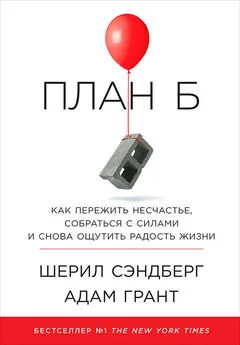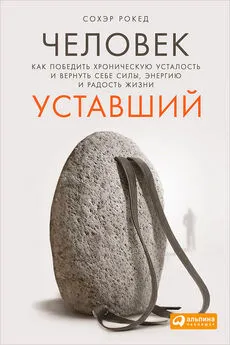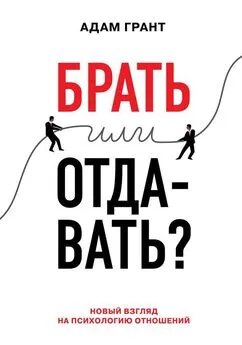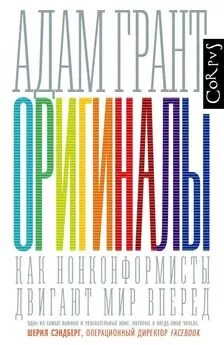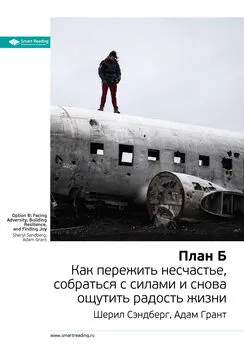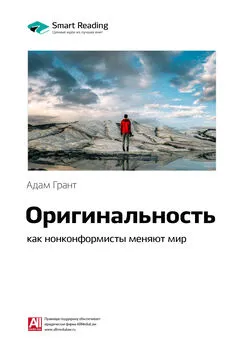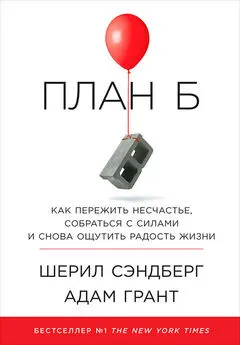Адам Грант - План Б: Как пережить несчастье, собраться с силами и снова ощутить радость жизни
- Название:План Б: Как пережить несчастье, собраться с силами и снова ощутить радость жизни
- Автор:
- Жанр:
- Издательство:Литагент Альпина
- Год:2018
- Город:Москва
- ISBN:978-5-9614-5128-3
- Рейтинг:
- Избранное:Добавить в избранное
-
Отзывы:
-
Ваша оценка:
Адам Грант - План Б: Как пережить несчастье, собраться с силами и снова ощутить радость жизни краткое содержание
«План Б», основанный на личном трагическом опыте Шерил и новаторских исследованиях Адама, содержит в себе набор методик и рекомендаций по преодолению жизненных кризисов, развитию эмпатии и любви к самому себе, построению крепкой семьи и созданию прочных отношений с партнером и коллегами по работе.
План Б: Как пережить несчастье, собраться с силами и снова ощутить радость жизни - читать онлайн бесплатно ознакомительный отрывок
Интервал:
Закладка:
«друг, не задающий вопросов»: Tim Urban, "10 Types of Odd Friendships You're Probably Part Of," Wait but Why , December 2014: http://waitbutwhy.com/2014/12/10-types-odd-friendships-youre-probably-part.html. Доказательства того, что люди больше нравятся окружающим, когда задают больше вопросов, см. в: Karen Huang, Mike Yeomans, Alison Wood Brooks, et al., "It Doesn't Hurt to Ask: Question-Asking Encourages Self-Disclosure and Increases Liking," Journal of Personality and Social Psychology .
«Наш ребенок умирает снова»: Mitch Carmody, цит. по: Linton Weeks, "Now We Are Alone: Living On Without Our Sons," All Things Considered , NPR, September 3, 2010: www.npr.org/templates/story/story.php?storyId=128977776.
термин «эффект мумии»: Sidney Rosen and Abraham Tesser, "On Reluctance to Communicate Undesirable Information: The MUM Effect," Sociometry 33 (1970): 253–63.
Доктора не хотят говорить: Joshua D. Margolis and Andrew Molinsky, "Navigating the Bind of Necessary Evils: Psychological Engagement and the Production of Interpersonally Sensitive Behavior," Academy of Management Journal 51 (2008): 847–72; Jayson L. Dibble, "Breaking Bad News in the Provider-Recipient Context: Understanding the Hesitation to Share Bad News from the Sender's Perspective," in Medical Communication in Clinical Contexts , ed. Benjamin Bates and Rukhsana Ahmed (Dubuque, IA: Kendall Hunt Publishing, 2012). См. также: Walter F. Baile, Robert Buckman, Renato Lenzi, et al., "SPIKES – A Six-Step Protocol for Delivering Bad News: Application to the Patient with Cancer," The Oncologist 5 (2000): 302–311.
болезненный удар током: Timothy D. Wilson, David A. Reinhard, Erin C. Westgate, et al., "Just Think: The Challenges of the Disengaged Mind," Science 345 (2014): 75–77.
психологи так и называют их – «вскрыватели»: Lynn C. Miller, John H. Berg, and Richard L. Archer, "Openers: Individuals Who Elicit Intimate Self-Disclosure," Journal of Personality and Social Psychology 44 (1983): 1234–44.
Люди, сами пережившие тяжелые события, часто проявляют: Daniel Lim and David DeSteno, "Suffering and Compassion: The Links Among Adverse Life Experiences, Empathy, Compassion, and Prosocial Behavior," Emotion 16 (2016): 175–82. При этом справившиеся с последствиями тяжелого события, видя, как другие не в состоянии этого сделать, могут оказаться не столь отзывчивы: Rachel L. Ruttan, Mary-Hunter McDonnell, and Loran F. Nordgren, "Having 'Been There' Doesn't Mean I Care: When Prior Experience Reduces Compassion for Emotional Distress," Journal of Personality and Social Psychology 108 (2015): 610–22.
«те, кто видит друг у друга»: Anna Quindlen, "Public and Private: Life After Death," The New York Times , May 4, 1994: www.nytimes.com/1994/05/04/opinion/public-private-life-after-death.html.
Ветераны войн, жертвы насилия и родители: Darrin R. Lehman, John H. Ellard, and Camille B. Wortman, "Social Support for the Bereaved: Recipients' and Providers' Perspectives on What Is Helpful," Journal of Consulting and Clinical Psychology 54 (1986): 438–46.
В Китае и Японии идеальным эмоциональным состоянием: Jeanne L. Tsai, "Ideal Affect: Cultural Causes and Behavioral Consequences," Perspectives on Psychological Science 2 (2007): 242–59.
«по стандартам американской культуры»: David Caruso, цит. по: Julie Beck, "How to Get Better at Expressing Emotions," The Atlantic , November 18, 2015: www.theatlantic.com/health/archive/2015/11/how-to-get-better-at-expressing-emotions/416493/.
«шепот снаружи»: Quindlen, "Public and Private."
Я излила душу в посте: Sheryl Sandberg, Facebook post, June 3, 2015: www.facebook.com/sheryl/posts/10155617891025177:0.
откровенный разговор о тяжелых событиях: Обзор см. в: James W. Pennebaker and Joshua M. Smyth, Opening Up by Writing It Down: How Expressive Writing Improves Health and Eases Emotional Pain (New York: Guilford, 2016). Больше подробностей в главе 4.
люди нетрадиционной ориентации, вышедшие из семей иммигрантов: Anthony C. Ocampo, "The Gay Second Generation: Sexual Identity and the Family Relations of Filipino and Latino Gay Men," Journal of Ethnic and Migration Studies 40 (2014): 155–73; Anthony C. Ocampo, "Making Masculinity: Negotiations of Gender Presentation Among Latino Gay Men," Latino Studies 10 (2012): 448–72.
«Худшим было одиночество и та изоляция»: Emily McDowell, цит. по: Kristin Hohendal, "A Cancer Survivor Designs the Cards She Wishes She'd Received from Friends and Family," The Eye , May 6, 2015: www.slate.com/blogs/the_eye/2015/05/06/empathy_cards_by_emily_mcdowell_are_greeting_cards_designed_for_cancer_patients.html.
Эмили придумала «карточки эмпатии»: http://emilymcdowell.com/. См. также: Kelsey Crowe and Emily McDowell, There Is No Good Card for This: What to Say and Do When Life Is Scary, Awful, and Unfair to People You Love (New York: HarperOne, 2017).
«Когда в вашей жизни случается трагедия»: Tim Lawrence, "8 Simple Words to Say When Someone You Love Is Grieving," Upworthy , December 17, 2015: www.upworthy.com/8-simple-words-to-say-when-when-someone-you-love-is-grieving.
классические эксперименты с громким шумом: David C. Glass and Jerome Singer, "Behavioral Consequences of Adaptation to Controllable and Uncontrollable Noise," Journal of Experimental Social Psychology 7 (1971): 244–57; David C. Glass and Jerome E. Singer, "Experimental Studies of Uncontrollable and Unpredictable Noise," Representative Research in Social Psychology 4 (1973): 165–83.
Когда люди страдают, им нужна кнопка: Brian R. Little, Me, Myself, and Us: The Science of Personality and the Art of Well-Being (New York: Public Affairs, 2014).
Есть два типа эмоциональных реакций: C. Daniel Batson, Jim Fultz, and Patricia A. Schoenrade, "Distress and Empathy: Two Qualitatively Distinct Vicarious Emotions with Different Motivational Consequences," Journal of Personality 55 (1987): 19–39.
«Одни друзья каждый день заходили»: Allen Rucker, The Best Seat in the House: How I Woke Up One Tuesday and Was Paralyzed for Life (New York: HarperCollins, 2007).
В одном эксперименте людям предлагали: Loran F. Nordgren, Mary-Hunter McDonnell, and George Loewenstein, "What Constitutes Torture? Psychological Impediments to an Objective Evaluation of Enhanced Interrogation Tactics," Psychological Science 22 (2011): 689–94.
следовать платиновому правилу: этот термин приписывается многим источникам. Одно из лучших его описаний дано в работе Карла Поппера: «Золотое правило – это хороший стандарт, который, возможно, стоило бы улучшить: если это возможно, поступайте с другими так, как они сами поступили бы с собой»: Karl Popper, The Open Society and Its Enemies , vol. 2 (New York: Routledge, 1945/1966).
«Несмотря на лучшие намерения, такой жест»: Bruce Feiler, "How to Be a Friend in Deed," The New York Times , February 6, 2015: www.nytimes.com/2015/02/08/style/how-to-be-a-friend-in-deed.html.
«Какие-то вещи в жизни невозможно исправить»: Megan Devine, Refuge in Grief: Emotionally Intelligent Grief Support, по состоянию на 14 декабря 2016 г.: www.refugeingrief.com/.
Психологи помещали девочек-подростков в стрессовую ситуацию: Jessica P. Lougheed, Peter Koval, and Tom Hollenstein, "Sharing the Burden: The Interpersonal Regulation of Emotional Arousal in Mother-Daughter Dyads," Emotion 16 (2016): 83–93.
разработала «теорию колец»: Susan Silk and Barry Goldman, "How Not to Say the Wrong Thing," Los Angeles Times , April 7, 2013: http://articles.latimes.com/2013/apr/07/opinion/la-oe-0407-silk-ring-theory-20130407.
пяти стадий горя: Elisabeth Kübler-Ross, On Death and Dying (New York: Routledge, 1969).
это не пять стадий: Holly G. Prigerson and Paul K. Maciejewski, "Grief and Acceptance as Opposite Sides of the Same Coin: Setting a Research Agenda to Study Peaceful Acceptance of Loss," The British Journal of Psychiatry 193 (2008): 435–37. См. также: Margaret Stroebe and Henk Schut, "The Dual Process Model of Coping with Bereavement: Rationale and Description," Death Studies 23 (1999): 197–224. Как объяснила нам социальный работник Кэрол Гейтнер, модели стадий «также минимизируют индивидуальность и разнообразие человеческой скорби. Возможны разные проявления горя и стратегии его переживания. Модели скорби создают проблемы, когда их воспринимают как обязательные. Более современные модели подчеркивают индивидуальность. Стремление свести все к общим моделям можно понять, так как человек хочет определенности и предпочитает знать, что где-то есть конечная точка, план игры, какая-то предсказуемость, но у них есть и оборотная сторона: модели не могут описать реального горя. Они дают иллюзорный комфорт. Каждая потеря уникальна».
Взрослея, мы сохраняем лишь действительно значимые отношения: Laura L. Carstensen, Derek M. Isaacowitz, and Susan T. Charles, "Taking Time Seriously: A Theory of Socioemotional Selectivity," American Psychologist 54 (1999): 165–81.
Читать дальшеИнтервал:
Закладка:
